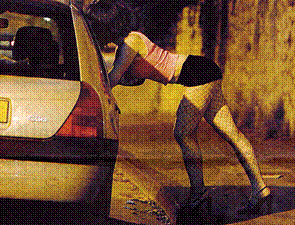Part 1: Prostitution
Often referred to as the oldest (or second oldest) profession, prostitution has been a persistent phenomenon in human history. The following video offers a historical account of prostitution from ancient Greece to the modern America .
VIDEO: " History of Prostitution: Sex in the City ."
In American law prostitution was widely allowed (especially in the West) until the early part of the 20 th century. This is not to suggest that prostitution was an accepted profession, but it was legal. Some prostitutes were "streetwalkers" who solicited customers in the streets while others worked in brothels where many women would work. The brothel system had two advantages over streetwalking. First, it was not as visible so as not to upset the local community. Second, it was safer as it occurred in a controlled environment. Following a movement against prostitution Congress passed the "White Slave Traffic Act" (the Mann Act of 1910) forbidding the interstate transport of women and girls for immoral purposes.
 This federal law was bolstered by many local laws prohibiting prostitution. There were three reasons given to criminalize prostitution. First, some prostitutes were said to be unfortunate victims coerced into an immoral trade who should be rescued and rehabilitated. Second, some prostitutes were said to be inferior people who sought to spread immorality and corrupt others with their trade. Third, various social and criminal problems were associated with prostitution, including drug use and theft.
This federal law was bolstered by many local laws prohibiting prostitution. There were three reasons given to criminalize prostitution. First, some prostitutes were said to be unfortunate victims coerced into an immoral trade who should be rescued and rehabilitated. Second, some prostitutes were said to be inferior people who sought to spread immorality and corrupt others with their trade. Third, various social and criminal problems were associated with prostitution, including drug use and theft.
The legal end to prostitution did not end the practice but did drive it underground. Today, there are streetwalkers (who are the most visible and the most commonly arrested), call girls who operate out of their residences seeing only regular customers, and there is a return of the brothel in so called "massage parlors" where sex is often exchanged as part of the massage. In modern America prostitution is illegal (but occurring) in 49 states. Only in Nevada is prostitution legal.
Prostitution in Nevada is legal in some areas but is also heavily regulated. It is illegal to solicit in the street, so streetwalkers do not operate legally. Nevada allows each county to determine its own prostitution laws, and they vary greatly. A typical county which allows prostitution only allows licensed brothels. Brothel owners pay a fee for a license. The prostitutes themselves must undergo mandatory testing for STD's, and the use of condoms is also required.
Thought Question: Is the prostitute motivated by vice?
It may be that the customer (John) of a prostitute is motivated by the vice of lust, but what about the actions of the prostitute? Certainly prostitutes themselves are not motivated by lust for their customers. If prostitutes are not motivated by lust, then what, if any, vice motivates them? We might find some prostitutes are motivated by greed (getting rich), but what about the significant amount of prostitutes who are in it to make a living? Are prostitutes motivated by vice?

Should prostitution be a crime? There are several arguments for and against this proposition which warrant our attention.
 For:
For:
- Prostitution is going to occur whether it is a crime or not. Legalizing and regulating it has better consequences. Prostitutes would be safer due to working in a safer environment away from pimps and violent customers. Legal regulations can reduce the spread of STD's. The use of zoning (like Nevada ) can keep it out of sight where children and citizens won't be bothered by it.
- Prostitution is a victimless crime. When it is a consensual agreement between two (or more) adults, then there is no harm to others such that the harm principle holds that the state may not criminalize the behavior.
- Criminalizing prostitution takes away liberty. Women and men are free to engage in sex for free (or exchange it for dinner, drinks, and a movie), so why do they not have the freedom to profit from their activities? Athletes and laborers profit by using their bodies; why can't a prostitute?
 Against:
Against:
- Legalizing prostitution only encourages the vice. Though criminalization may not stop it, legalization will lead to its expansion and sends the message that "it is ok" to be a prostitute. This only encourages the further sexual exploitation of women.
- Prostitution does a harm to women. Prostitution is not a choice of liberty but is typically a necessity for the poor, homeless, and drug users. Legalization abandons these people to an unhappy life. Instead, society should stop their activities when possible for their own good and offer rehabilitation programs to help them lead a virtuous life.
- Prostitution is not a victimless crime. What may appear as a consensual arrangement does affect other people. Where prostitution occurs, there is an increase in the crimes of theft, assault, and murder. Allowing prostitution may also increase the spread of STD's, which often does affect others (including the unknowing spouses of "Johns").